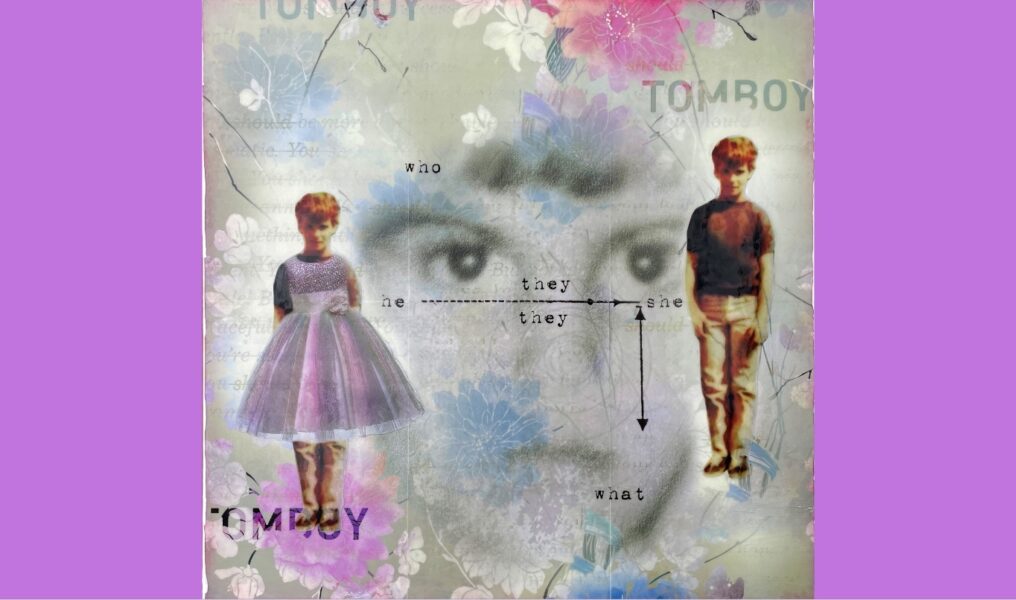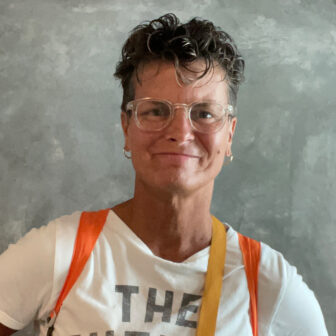How One Lesbian Michigan Artist Faced Her Past to Embrace Her Present and Future, One Journal at a Time
Ruth Crowe’s ‘Journal Project’ exhibition encourages viewers to self reflect

It’s not possible to truly peer inside the mind of another person, but Ruth Crowe’s “The Journal Project” art installation comes close to simulating such an experience. On display through January at CultureVerse Gallery in Ann Arbor, the project allows visitors an opportunity to take a long stroll through the most intimate chambers of Crowe’s heart and mind thanks to an exploration of her personal journals.
Crowe has been keeping a journal for more than 43 years, accumulating 72 handwritten volumes teeming with her life’s heartaches, accomplishments, embarrassing moments and the many times she’s triumphed in the face of adversity. The journals, she says, were her constant companions throughout the decades of her life when she lived in multiple states, including when she served in the U.S. Army at a time when coming out as a lesbian would have brought her participation to a screeching halt. The journals were there to record her experiences on the L.A.P.D. during the Rodney King riots and times when she found (and lost) love.
Some of the entries Crowe selected for The Journal Project are more mundane — the stuff of everyday life. It’s here, perhaps, where visitors might see themselves reflected back in the pages, but Crowe hopes her project inspires more than a brief, passing emotion. “I really want people to think about their own lives and have that introspection and realize that it’s the most important thing in life,” she says. “You only have one, and you need to try to pay attention.”
Crowe grew up in West Michigan, attending Allendale High School and a year at Grand Valley State University before she transferred to Texas Woman’s University, which appealed to her because of its strong softball program. She went on to become a collegiate softball coach (and a nationally ranked athlete in multiple sports) before serving in the Army and as a police officer — a collection of careers that took Crowe all over the world and connected her to people who hailed from different places and experiences.
If there’s a constant to be found in Crowe’s richly varied background, it might be a pattern of risk and reward that has propelled her to one of the riskiest moves she’s made — stepping away from the expected path and going all in on becoming a full-time, working artist.
“It’s so hard to make a living selling your art,” she acknowledges. “If you’d said to me I was going to be in galleries or selling art or doing something like The Journal Project, I don’t know if I would have believed you. I didn’t foresee that. I just knew I needed to try to pursue it. It’s really who I probably should have been all along.”

Still, Crowe says, “I honestly believe all of those things that happened to me when I was younger, that I talk about in this project, really helped me become the artist I am now.”
Figuring out how best to display The Journal Project was a monumental task. Crowe knew she wanted her entries to be displayed alongside her unique artwork, which focuses on a dreamy multimedia aesthetic that weaves together vintage photography and ephemera with the written word and other warm, evocative touches. Deciding how to really immerse viewers into an experience that went beyond the obvious — paging through her journals — was a challenge, but CultureVerse helped Crowe with high-tech tools to create a seamless, visually striking exhibit available online and in person.
The final product meshes Crowe’s written and visual art with her soothing, clear-voiced narration for each entry, followed by a snippet of a song selection and a quote inspired by the entry. The entire show is available online as a virtual exhibit accessible from the CultureVerse website (cultureverse.org/project/ruth-crowe).
The events Crowe documents in the project include dark moments. One entry, “Walk of Shame,” describes the morning after Crowe was raped by a male colleague. Waking up, alone, in a freezing cold apartment building clubhouse, Crowe walked the three miles home and never sought medical help, a regret she shared in her journal. “I never went to the doctor — I should have,” she narrates. “I had to wait to see if I was pregnant until my next period and lucky for me I wasn’t. The shame of this event lasted longer than any pregnancy.” Crowe selected the song “Walk of Shame” by Pink to accompany this entry.
Other entries detail Crowe’s childhood, including a terse relationship with her mother, who, Crowe writes and narrates, was never really comfortable raising a gay daughter. Later in life, she and her mother reached a better place, but the sting of childhood rejection would weigh heavy on the artist for decades. The entry “Lo Siento, Madre” is one of several entries that touch on this strained relationship. “Forgiving is not forgetting. And forgetting is not forgiving,” she writes. “...Her early rejection was something I carried with me like a touchstone in my pocket, rubbed smooth from the years of resentment.” Crowe selected a quote from motivational author and speaker Mel Robbins to accompany the entry: “Forgive others not because they deserve forgiveness, but because you deserve peace.”
Pouring over her 72 journals was a laborious, sometimes painful process. “Typically, [the entries] were things that were not very happy or that I was struggling with,” Crowe recalls. “I needed to write it down because I felt like it allowed me the opportunity to really see I was trying to figure myself out, like ‘Am I really being honest with myself?’ It was this constant questioning of what was going on in my life. That’s hard to read later on.”
Crowe was surprised by how frequently she mentioned suicide. “The thing about suicide is that it’s like we can’t say the word,” she notes. “[At times], I just felt like there was no point, but I was more worried about who was going to get my journals. I wrote that on many occasions: ‘If I do this, who’s going to get my journals?’”
Reading the journals allowed Crowe to see she’s spent a lot of time being very hard on herself. “We beat ourselves up so much about who we are and how we’re not what someone else really wants,” she says. “When I got a divorce right around the pandemic, I blamed myself to an extent. ‘What is it that stops me from maintaining a long-term relationship?’ I was with this person for 13 years, the longest I’d ever been with anybody or lived anywhere. I’m kind of like this rolling stone, and I really wanted to address that.”

This revelation led Crowe to what may be one of her most pivotal “a-ha” moments. “I realized that’s kind of how I learned to survive, all along the way,” she says. “I existed, and I survived on my own because I didn’t feel like I had that connection to my mother, certainly, but even with my family, I was a part, but apart.” Crowe’s journal entry “A part Apart” explores this topic.
“And so for me now, at 63 years old, looking back, I realized that had shaped and influenced everything in my life. And it was interesting to learn that finally and really accept it, like ‘It’s OK because it’s who you are. It’s how you learned to survive. And you are not all of a sudden going to become this other person.’”
Crowe would like for The Journal Project to become a traveling exhibit. “I want people to talk about these things,” she says. One particular topic on her mind is LGBTQ+ youth. She’s noticed there’s a perception that gay kids today have it easy. “But no,” she says. “These kids are still being bullied. Gay teen suicide is still at an all time high. In some respects, things are different, but overall, no, it’s still very difficult.”
Case in point: the challenge Crowe has faced in bringing an educational program related to The Journal Project to her alma mater, Allendale High School, where she was added to the school’s Hall of Fame a few years ago in honor of her time as a softball pitcher on a team that won a state championship. “It went in front of the school board, whether or not they were going to allow me to come in,” she says. “There were people in the community adamantly opposed that I was going to be coming there to speak, because I think they think I’m going to come there and recruit, like set up this little table and recruit.” The board did vote in favor of bringing the program to the school, by a 5-2 margin.
Crowe isn’t sure what kind of restrictions might be requested from the board, but her focus for the educational program is about the power that can be found in journaling, especially psychological benefits — she is partnered with a mental health group located in West Michigan, Arbor Circle. “It’s about mental health, finding a creative outlet. To me, that’s what the whole project is all about,” she says.
The Journal Project is on display in person at CultureVerse Gallery (309 S. Main St., Ann Arbor) through the end of January and online at cultureverse.org/project/ruth-crowe. The show will also be on display at the Saugatuck Center for the Arts from Feb. 10 to May 12, 2023. Find more details at sc4a.org.










